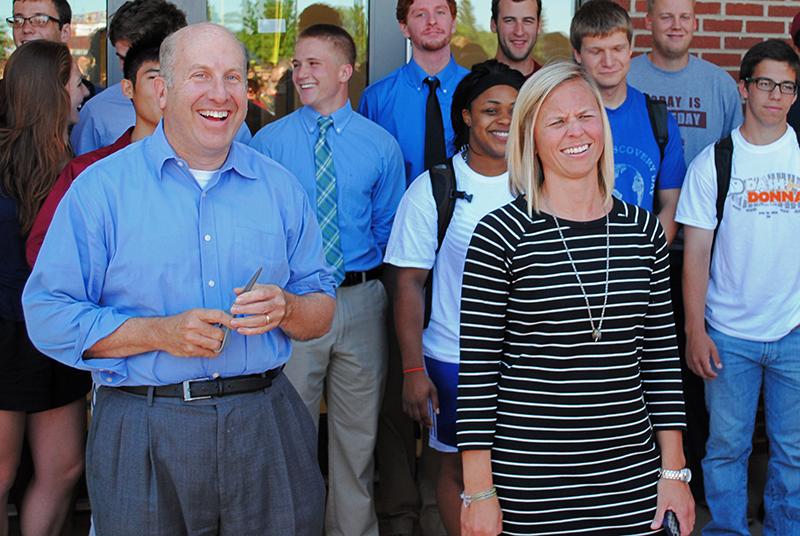NACWAA, NCAC Honor Oberlin Administrators
College President Marvin Krislov (left) and Natalie Winkelfoos share a laugh outside the Austin E. Knowlton Athletic Complex. This summer, the NCAC elected Krislov as Conference president and the NACWAA awarded Winkelfoos Administrator of the Year for Division III Athletics.
September 4, 2015
Oberlin’s Administration earned commendations for achievement in athletic leadership and management this summer. President Marvin Krislov was elected President of the North Coast Athletic Conference, while Delta Lodge Director of Athletics Natalie Winkelfoos was honored with the NACWAA award for Administrator of the Year in Division III Athletics.
Both Krislov and Winkelfoos were recognized for being inclusive, accessible leaders who exert a concentrated effort to provide athletic opportunities to all students, especially those who are potentially disadvantaged in athletic communities, according to NCAC and NACWAA press releases for the honors.
Krislov’s responsibilities in the NCAC will not drastically change with his new position, as the conference’s decisions and initiatives are still decided by the administrative group as a whole. The main addition to his role will be to convene administrative meetings, he said.
According to Krislov, his new position in the NCAC doesn’t fall outside board services that school presidents typically provide. He was active in NCAC’s administration, and many other administrative boards, long before his ascension to conference president.
In previous years, Krislov chaired a committee on diversity that eventually led to the NCAC Branch Rickey initiative, a proposal to hire more coaches actively committed to promoting racial diversity in staffing.
The initiative, launched in 2008, is named for Branch Rickey, manager of the Brooklyn Dodgers, who brought Jackie Robinson to the team in a historic breach of the color barrier in the sports world. The program was recognized with a large grant stipend from the NCAA.
“What we were noticing — and it’s still a challenge — is as we were recruiting for [staff and coaching positions], we did not always have the most diverse pools,” Krislov said.
This mindful leadership is also what earned Natalie Winkelfoos recognition for her transformative effect on the athletics program, which she believes is on a positive trajectory at Oberlin.
The NACWAA, a premier leadership summit for women working in intercollegiate athletics, honored Winkelfoos based on her “intelligence, enthusiasm and ability to manage people” and her reputation as an “innovative, inspirational and inclusive leader,” which they believe have revitalized health and wellness at Oberlin. “This honor is just another signal … that Oberlin College athletics has arrived,” Winkelfoos said.
The Athletic Director emphasized that it wasn’t just summer accolades, but the entire 2014-2015 year that spoke volumes for the progress made in Oberlin’s athletics program.
Five coaches — women’s lacrosse coach Lynda McCandlish, men’s tennis coach Eric Ishida, women’s swimming and diving coach Andrew Brabson, women’s cross country coach Ray Appenheimer and women’s basketball coach Kerry Jenkins — were distinguished as conference Coach of the Year. Additionally, Oberlin College finished fifth in the NCAC All-Sports Trophy competition, the school’s highest finish to date.
This growth, according to Winkelfoos, is the result of a firm commitment across the athletic department to use athletics as an avenue to generate pride and energy for the entire Oberlin community.
Goals of revitalization through inclusion will be at the center of Winkelfoos’ plans for Oberlin in the coming year, she said.
“Our department would very much like to proclaim ourselves as constant contenders for championships, but our goal is always to establish venues … that add value to the college experience for all members of our community,” she said.
Krislov’s plans within the NCAC for all conference schools also highlight accessibility in athletics. He mentioned foundations for discussions to “make sure students are able to balance athletics and competition,” an allusion that will likely translate into clarifying student schedules with regards to athletic events and continuing efforts to garner support for athletics within the conference schools.





















